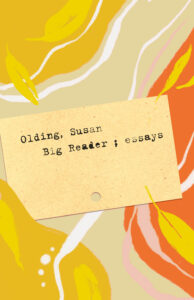May 10, 2021
Big Reader, by Susan Olding
Susan Olding’s essay collection, Big Reader, is a bibliophile’s delight. The follow-up to her 2008 collection Pathologies affirms should be on the radar of all book-loving people whose hearts skip a beat at the sight of Natalie Olsen’s marbled cover art, a riff on vintage endpapers. But then of course if you look closely, you will notice that the design is less abstract than it first appears, and the marble is a river, and leaves are floating on its surface, and a leaf can be the page of a book or something growing on a tree, to be gathered with a rake when it eventually flutters to the ground, and there’s even an essay on rakes, as in the garden tool and the 18-century series of engravings by William Hogarth “A Rake’s Progress.” Mutability is a theme of, well, life itself, as Olding’s collection attests.
She writes about Anna Karenina and her own affair in a fabulous essay on rereading. She reflects on infertility at Keats’ house. (I just finished reading Barbara Pym’s new biography, which also includes a scene at Keats’ house, a tragic scene in which Pym occurs in a cameo role in one of her novels. It seems like no one has a lot of fun at Keats’ house.) Fairy tail tropes and stepmothering in her essay “Wicked,” which first appeared in the essay collection The M Word, which I edited in 2014. Inspired by Woolf, she writes of “Library Haunting.” On how her mother’s reading life changed as the result of her vision loss. About reading The Golden Notebook on a resort vacation to Hawaii, kind of incongruous. In “Another Writers Beginnings,” which is a response to Eudora Welty and seems in conversation (or at least keeping rhythm) with Joan Didion circa Slouching Toward Babylon, Olding writes a take on self-doubt that I found against the grain of our current moment and also absolutely refreshing—that our self-doubt can serve us as writers. Who would we be without it?
I’d read in a previous review that Oldings essays on Toronto during the AIDs crisis (and the Don River) and another on blood types seem incongruous with the collection’s theme of books and reading, but they actually worked for me, for the way that Olding reads the landscape like a story in the former, and the body in the latter, always searching for signs. She writes about working at a bookstore in downtown Toronto, and how she used to read at the counter, and the oversized atlas kept getting stolen on her watch. Throughout the whole book, she writes about a refusal to conform, to fall into line, to veer into the unexpected, to be one thing and then quite another. “I needed to wander. I wanted to follow a string of words.”







Kerry, I can’t believe I just saw this now. THANK YOU!! I was off SM for about a month and am just getting caught up on stuff, but how weird I didn’t find this earlier. Anyway — so grateful for your engagement and your thoughts — you understood what I was up to, completely, and I love that.